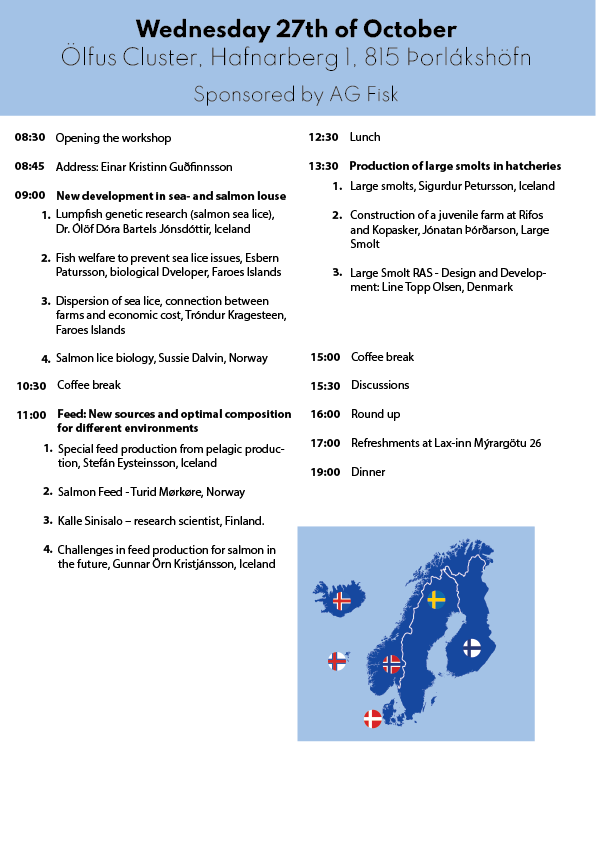Viðburðurinn Nordic Salmon um laxeldi fór fram þann 27. október 2021 á Ölfus Cluster, Hafnarbergi 1, 815 Þorlákshöfn.
Viðfangsefni vinnufundarins voru:
- Fóðurgerð framtíðar fyrir laxeldi
- Viðbrögð framtíðar við lúsavanda við eldi í sjó
- Ræktun stórseiða í stýrðu umhverfi á landi (RAS
Fundurinn var opinn öllum sem höfðu áhuga á laxeldi og vildu kynna sér það helsta sem er að gerast varðandi viðfangsefni hans. Mikil umræða hefur verið um landeldi, en ræktun á stórseiðum er að hluta til landeldi þar sem vistun í sjókvíum er stytt en lengd í stýrðu eldi á landi. Það er hluti af baráttunni við t.d. laxa/fiskilús.

Erindi fundarins hafa verið hengd við dagskrána hér:
New development in sea- and salmon louse
- Lumpfish genetic research: Dr. Ólöf Dóra Bartels Jónsdóttir, Iceland
- Fish welfare to prevent sea lice issues: Esbern Patursson, Faroes Islands
- Dispersion of sea lice, connection between farms and economic cost: Tróndur Kragesteen, Faroe Islands
- Salmon lice biology, Sussie Dalvin, Norway
Feed: New sources and optimal composition for different environments
- Special feed production from pelagic production, Sigurjón Arason, Iceland
- Salmon Feed: Turid Mørkøre, Norway
- Kalle Sinisalo: Research scientist, Finland
- Challenges in feed production for salmon in the future, Gunnar Örn Kristjánsson, Iceland
Production of large smolts in hatcheries
- Large smolts production: Sigurdur Petursson, Iceland
- Construction of a juvenile farm at Rifos and Kopasker, Jónatan Þórðarson, Large Smolt
- Large Smolt RAS – Design and Development: Line Topp Olsen, Denmark
English
A workshop on salmon farming was held on October 27 at Ölfus Cluster, Hafnarberg 1, 815 Þorlákshöfn.
The workshop subjects:
- Salmon feed: new sources and optimal composition for different environments
- New development in sea- and salmon louse
- Production of large smolts in hatcheries
- Salmon feed will be a very dynamic area of research and development in the future. With feed requirements of salmon growing in extreme environmental conditions, such as low temperature, are not fully understood. Furthermore, technical solution to minimize movements of fish in sea cage during the coldest periods in winter could improve conditions of fish during the coldest months
- Several options already exist for chemically treating salmon lice in sea cages. However, there are two main problems associated with treating lice in such a way. Firstly, there are negative environmental impacts and secondly, lice can and have developed resistance to many of the available chemicals currently being used
- There has been a growing interest in land-based salmon farming under more controlled environment. Large smolt farming is a land-based farming, with longer growing time ashore and shorter in ONP, reducing risk in farming with higher cost. Reducing lead time in sea also enables producers to reduce the spread in biomass throughout the year. This may be one of the most sustainable ways of maximizing utilization of licenses.
The meeting was open for anybody interested in salmon farming.
The board
- Gunnar Thordarson, Matís, Isafjordur, Iceland
- Björgolfur Hávardsson, NCE Seafood Innovation Cluster AS Norway
- Gunnvør á Norði and Jóhanna Lava Kötlum, Fiskaaling, Faroe Islands
- Kurt Buchmann, Department of Veterinary and Animal Sciences, University of Copenhagen, Frederiksberg, Denmark
- Niels Henrik Henriksen, The Danish Aquaculture Organisation, Aarhus, Denmark
- Marko Koivuneva, Finnish Fish Farmers’ Association, Helsinki, Finland.
Instituions participating
- Matís ohf. – Gunnar Thordarson (Iceland)
- Björgolfur Hávardsson, NCE Seafood Innovation Cluster AS Norway
- Fiskaaling – Gunnvør á Norði and Jóhanna Lava Kötlum – (Faroe Islands)
- University of Copenhagen, Department of Veterinary and Animal Sciences, Frederiksberg – Kurt Buchmann (Denmark)
- The Danish Aquaculture Organisation, Aarhus – Henrik Henriksen (Denmark)
- Finnish Fish Farmers’ Association, Helsinki – Marko Koivuneva (Finland
- Ölfus Cluster – Páll Marvin Jónsson

